It's not necessary to add cereal to your baby's bottle unless the doctor recommends it. Contrary to popular belief, introducing solid foods or cereal to the baby's diet won't help the baby sleep through the night. It could pose a potential risk and may not be worth the choice.
How to Make Baby Formula with Oatmeal?
By: Suzanne Renee' - October 25, 2023 - 8 Minute Read
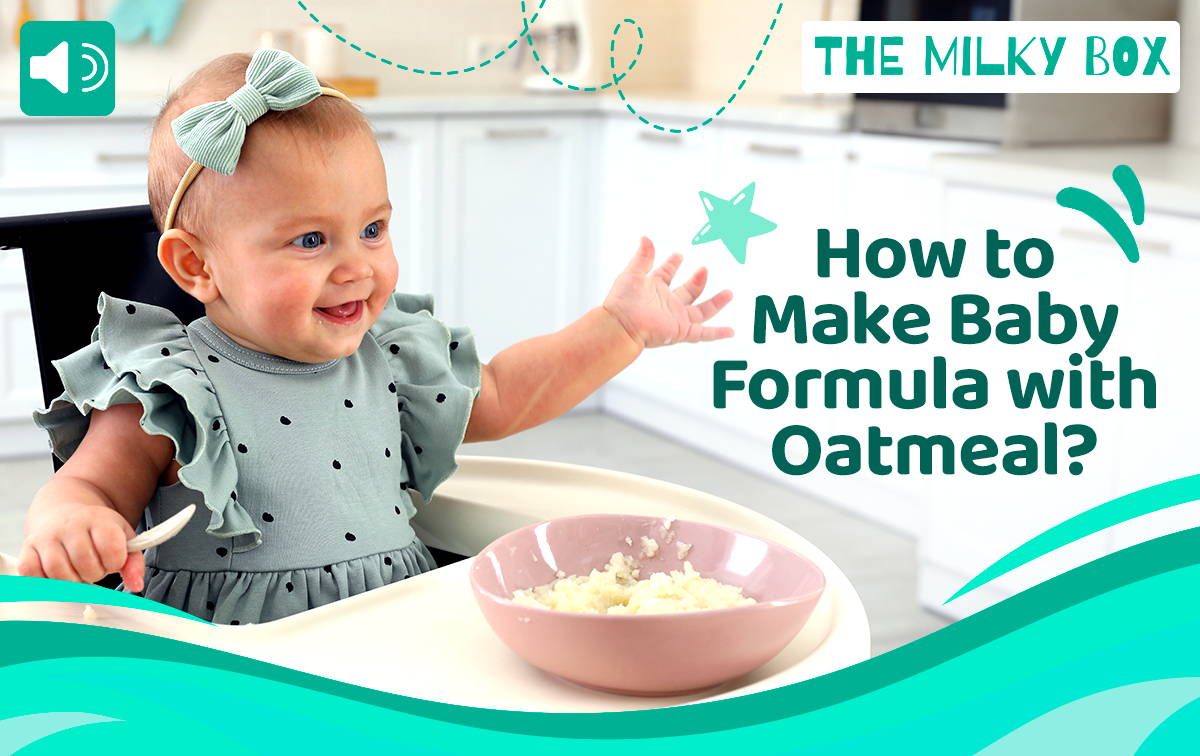
Introducing solid food to your baby is a significant milestone as a parent. You want to start with something that is healthy, easy to digest, and, most importantly, safe. That's where oatmeal comes in as an excellent choice for your baby's first food. Its mild taste and low risk of causing allergic reactions make it the perfect food to introduce your baby to the world of solid food.
But oatmeal is not just a safe option; it's a powerhouse single grain packed with nutrition. By introducing your baby to oatmeal, you provide them with nutritious food to help them grow and develop.
In this article, we'll take a closer look at the benefits of oatmeal and explore the best way to add it to your baby's favorite organic baby formula. Note however, oatmeal must be organic as non-organic oats are frequently laden with toxic pesticides such as glyphosate which can damage your infant’s sensitive digestive tract.
Table of Contents:
1. Health Benefits of Eating Oatmeal for Babies
2. Difference Between Oats and Oatmeal
3. When Can Babies Have Oatmeal Cereal in Their Formula?
4. How to Prepare Oatmeal for Babies
5. Three Types: Oatmeal for Babies
6. Can You Mix Oatmeal with Milk for Baby?
7. How to Make Oatmeal for Baby?
8. Formula with Oatmeal in a Bottle
10. Optional Flavorings to Add to Baby Oatmeal
11. How to Store Leftover Oats
12. Mixing Baby Formula with Oatmeal
13. Frequently Asked Questions
Health Benefits of Eating Oatmeal for Babies
Oats are a nutritious gluten-free grain packed with vitamins, minerals, fiber, and antioxidants, making them an excellent choice for babies.
Note that oats need to be certified gluten-free however to ensure they’re gluten-free. Oats are typically processed on the same machines as wheat and gluten from the wheat can infiltrate non-organic oats and potentially provoke wheat intolerances or allergies for sensitive infants.
Essential Nutrients
Oats contain a wide range of essential nutrients, including fiber, zinc, magnesium, calcium, B vitamins, and iron, which are all important for healthy growth and development.
Oats are also a reliable source of protein, which is essential for cell growth and development in babies. Adequate protein intake is vital for building and repairing tissues and muscles and forming enzymes, hormones, and other crucial body components.
Digestive Aid
As a single-grain cereal with a soft and smooth texture, oats are gentle on babies' digestive systems and an excellent food choice for infants just starting their solid food journey. The dietary fiber present in oats can act as a natural laxative, promoting healthy bowel movements and preventing constipation, a common issue in babies when transitioning from liquid nutrition to solid foods.
Moreover, the fiber in oats adds bulk to stools, which helps to move them through the digestive system smoothly. This helps to prevent any discomfort or pain in babies that may be caused by constipation, which can lead to fussiness, irritability, and even loss of appetite.
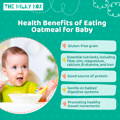
Difference Between Oats and Oatmeal
Oats are a type of cereal grain that is commonly used for food production. They can be consumed as whole grains or processed into oatmeal, a popular porridge-like dish. The term "oats" usually refers to whole grains, while "oatmeal" describes the processed or cooked form of the grains.
However, it is worth noting that these terms are now often used interchangeably in everyday conversation.
When Can Babies Have Oatmeal Cereal in Their Formula?
Breast milk or formula are the only sources of nourishment your newborn needs. The American Academy of Pediatrics recommends exclusive breastfeeding or in substitution baby formula for six months after birth.
However, between four to six months of age, most babies are usually ready to start eating solid foods in conjunction with breastfeeding or formula feeding. During this time, babies typically stop using their tongues to push food out of their mouths and begin to develop the coordination to move solid food from the front of their mouths to the back for swallowing.
In addition to age, keep an eye out for other signs that your baby is ready for solid foods. For instance:
- Can your baby hold their head in a steady, upright position?
- Can your baby sit with support?
- Is your baby mouthing their hands or toys?
- Is your baby showing a desire for food by leaning forward and opening their mouth?
If you answer affirmatively to these questions and your baby's healthcare provider agrees, you can supplement their liquid diet.

How to Prepare Oatmeal for Babies
Providing your baby with complete nutrition is crucial. Breast milk, formula, or a combination of both are the primary sources of nutrition for your baby, while prepared oatmeal can also be introduced as they grow older.
By continuing to feed your baby breast milk or formula and gradually introducing other foods like prepared oatmeal, you can ensure that they receive all the necessary nutrients for healthy growth and development.
Three Types: Oatmeal for Babies
Oats are available in three main types: quick oats, rolled oats (old-fashioned oats), and steel-cut oats. Each type's unique texture and cooking time make them suitable for different recipes and occasions.
Quick oats are the most processed and the quickest to make. However, they usually contain less fiber than the other two options.
Rolled oats are thinner than steel-cut oats and take less time to cook. They are also less processed than instant oats, making them an excellent middle ground between the other two types. Rolled oats are a versatile ingredient that can be used in various recipes. Their soft and creamy texture makes them ideal for oatmeal and baked goods.
Rolled oats can be added to breast milk or formula, depending on the recipe.
Steel-cut oats are the least processed of the three and have a more robust, chewy texture. They take longer to cook and require more water than the other two types. Steel-cut oats are perfect for savory dishes like pilafs, stews, and soups. They also work well in granola bars and cookies, giving them a nutty crunch and a unique flavor.
It is essential to note that steel-cut oats can be more challenging than the other two types, especially for babies and young children. Blending them into a thinned puree before serving them to your baby is better. Families may wish to finely grind steel coat oats or wait until their child is a year or older.
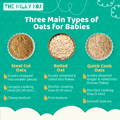
Can You Mix Oatmeal with Milk for Baby?
Oatmeal is a nutritious meal for your little one. To prepare it, you can mix it with breastmilk or your family's choice of pure and clean European baby formula. This will provide your baby with essential nutrients and ensure that their food is easy to digest and taste.
Simple Preparation
Oatmeal can be made using infant formula, breastmilk, or water; just make sure that you are using the appropriate mixing product for your baby’s age and oatmeal that is suitable for infants. Avoid mixing the oats with cow's milk until your baby is one year old or older.
Before your child is 12 months old, cow's milk may put your little one at risk for intestinal bleeding. It also has too many proteins and minerals for your baby's kidneys to handle and does not have the right amount of nutrients your baby needs.
How to Make Oatmeal for Baby?
Are you looking for a simple, nutritious way to introduce solid food to your baby? Look no further than preparing oatmeal in a bowl! Here's a detailed guide on how to make it:
1. Gather ingredients: To make oatmeal for your baby, gather the necessary ingredients. We recommend using your baby's preferred European formula or breastmilk, especially during the initial attempts. This will ensure that the new texture is introduced alongside a familiar taste. Make sure you select the appropriate mixing product for your baby's age and that the oatmeal is suitable for infants. Remember to use a clean, dry knife to level off each scoop of formula.
2. Prepare the formula: If using baby formula, carefully measure the recommended amount and level off each scoop with a clean, dry knife. This ensures that you provide your baby with the correct amount of nutrients.
3. Add oatmeal: Mix the oatmeal and liquid, ensuring that the oatmeal is thin enough. This will make it easier for your baby to eat. Let it sit briefly, checking the temperature to ensure it's safe for your baby's delicate mouth.
By following these steps, you can ensure your baby gets a nutritious, delicious, and safe meal that will help them transition to solid food.
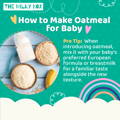
Formula with Oatmeal in a Bottle
Some parents believe adding oatmeal to their baby's bottle can help them sleep for extended periods. However, this false belief can also be dangerous for your baby's health. When oatmeal is added to a bottle, it thickens the liquid, which increases the risk of choking, a severe concern for infants.
Reflux in Babies
Feeding your baby with oatmeal in a bottle should only be done after consulting with your qualified provider and, in some cases, may help babies with acid reflux.
If you decide to use oatmeal in your baby's bottle, it is essential to mix it properly. Most bottles should be filled with breastmilk or formula, and only a tiny amount of oatmeal (1 tsp) should be added. This proportion can be increased per your doctor's instructions. Monitoring your baby closely while feeding is crucial, as a thicker formula may pose a choking hazard.
It is highly recommended to consult your family medical advisor before introducing oatmeal to a baby's bottle. Naturally, thickened European baby formulas are available and specially designed to meet the nutritional and digestive needs of infants with acid reflux. These formulas can be discussed with your doctor to ensure your baby receives the best care without safety worries.
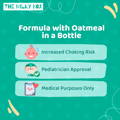
Bowl of Oatmeal
As you introduce solid foods to your little one, adding oatmeal to their diet is a great option. There are a few ways to do this. You can finely grind uncooked oats and mix them with breastmilk or formula.
Alternatively, you could prepare oatmeal porridge, which is nutritious, delicious, and easy for babies to digest. By including oatmeal in your baby's diet, you can provide them with essential nutrients like iron, fiber, and protein, which are crucial for their growth and development.
Oatmeal Porridge
Holle's organic oat porridge is a nourishing and wholesome choice for babies and children. This delicious cereal is enriched with thiamin (vitamin B1), a vital nutrient for proper cell function that promotes healthy growth and development in your little one.
One of the best things about this porridge is that it's free from eggs and lactose, making it an excellent option for babies with allergies or sensitivities. Additionally, it contains no added sugar, so you can feel good about feeding it to your child.
You have the flexibility to prepare this cereal in a variety of ways. It can be made as a dairy-free porridge, added to breastmilk, or mixed with your little one’s favorite European formula.
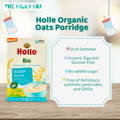
Holle Porridges
What's truly remarkable about Holle organic oat porridge and all variations in the line, they are certified Biodynamic, ensuring you're giving your child the highest quality nutrition. This certification prohibits using fertilizers, synthetic pesticides, and GMOs, so you can be confident that you're providing your little one with clean, pure, and wholesome food.
Holle's organic porridges are a fantastic choice for babies and children.

Optional Flavorings to Add to Baby Oatmeal
As your child grows and becomes more accustomed to the taste and texture of oatmeal, you can enhance their mealtime experience by introducing more flavorful and nutritious ingredients.
Appropriate healthy fats, vitamins, and iron can be added to their diet by incorporating age-appropriate fruits, vegetables, and grains that can be mashed or added in small pieces to the oatmeal. This adds flavor and variety to their diet, helps develop their palate, and encourages them to explore new tastes and textures.
Oatmeal Additions to Avoid
When introducing additional tastes and textures to your little one's oatmeal, it is crucial to be mindful of their immature digestive system. Certain foods can be challenging for babies to chew and digest, leading to tummy discomfort, allergic reactions, or hazards.
As such, it is important to wait before introducing specific foods and to consult with a qualified practitioner to ensure that you are making the right choices for your baby's health and development.
How to Store Leftover Oats
When storing oatmeal leftovers, you should store them in a small, airtight container in your fridge. This will keep the oatmeal fresh and edible for up to 3 days. As for serving, you can use hot water to thin out the oatmeal, or, if you prefer, you can use breastmilk or formula instead.
As your baby grows, you can start with plain unsweetened yogurt, and after they turn one, you can switch to toddler milk or whole animal cow's milk.
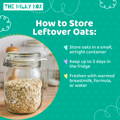
Use Leftover Oatmeal as a Thickener
Did you know you can use leftover cooked oatmeal to make your baby puree? This is a great way to thicken too-thin purees or combine new flavors. All you need to do is blend the cooked and cooled oatmeal with your desired age-appropriate fruit or vegetables until you reach the desired consistency.
Mixing Baby Formula with Oatmeal
One of the most nutritious and easy ways to introduce solid food to your little one is by mixing their preferred European baby formula into their oatmeal. This feeding method offers a rich and creamy texture that your baby will enjoy while providing them with essential nutrients for healthy growth and development.
Whether you opt for a scratch-made oatmeal recipe or purchase an organic ready-to-feed option, The Milky Box has covered you with the best quality products. Trust us to provide your baby with a wholesome and tasty meal every time for all stages of your feeding journey.
Frequently Asked Questions
Should I put oatmeal in the bottle to help my baby sleep through the night?
When can families give baby oatmeal?
When should we introduce oatmeal to our baby's diet? You can give oatmeal to your baby as soon as they start eating solid foods and if your pediatrician approves it. Mix it with water, breast milk, or your baby's favorite European formula for a simple and nutritious start.
Can you use regular oats for babies?
Yes, using any oats - whether rolled, quick, instant, or steel-cut is safe. You can even choose oat porridge for a fantastic alternative.
Disclaimer:
Please be aware that this information is based on general trends in babies, and it is not medical advice. Your doctor should be your first source of information and advice when considering any changes to your child’s formula and when choosing your child’s formula. Always consult your pediatrician before making any decisions about your child’s diet or if you notice any changes in your child.
Breastfeeding is the best nutrition for your baby because breast milk provides your child with all the essential nutrients they need for growth and development. Please consult your pediatrician if your child requires supplemental feeding.

Suzanne Renee' is an accomplished professional with extensive expertise in the area of infant nutrition, dedicated to promoting the health and wellbeing of children. She started this journey as a foster parent. Suzanne has emerged as a strong proponent of the European baby formula and has become a full time writer of the subject. In her free time, she enjoys camping, hiking and going to church.
Read Next:
Reviewed by Dr. Eric Wood, ND, MA

Dr. Wood is a licensed naturopathic doctor, with a doctorate degree from the Canadian College of Naturopathic Medicine in Toronto, Canada. He received his post-graduation certification in Mind Body Medicine at Harvard University.
With 15 years of experience, Dr. Wood is an Associate Professor of Holistic Nutrition at the American College of Health Sciences in Portland, Oregon. Dr. Wood is an educator, clinician, author, media figure, consultant, and owns his own holistic (naturopathic) medical practice in Ft. Lauderdale, Florida. Dr. Wood is currently researching and drafting books on cancer and pediatrics.
Outside of the medical profession, Dr. Wood loves singing with the Miami Lyric Opera and is an avid musician in South Florida. He also loves spending time with his wife and kids.

